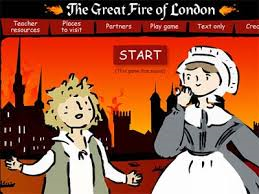Learn about this terrible event in the history of London and
PLAY A FUNNY GAME
at the end.
“Dad! Dad! Wake up! Something’s burning!”
When Thomas Farriner, King Charles II’s baker, went to bed on the night of September 1, 1666, he forgot to put out the ovens. Early the next morning, the wooden house caught fire, and by September 6, when they were finally extinguished, the flames had destroyed 80% of London.
Farriner’s maid was one of the surprisingly few (maybe only 6) people who died in the disaster, but the baker and his children escaped through a window. A month later, three members of the family were part of a jury that found a French watchmaker, Robert Hubert, guilty of deliberately starting the fire. The poor man, whose confession was possibly made under torture, was not even in the country on September 2!
But, back to the bakery on Pudding Lane. Sparks jumped across the street and set fire to straw in the stables of the Star Inn, and the blaze really got out of control in nearby Thames Street, with its warehouses full of flammable materials (oil, coal, alcohol, candles). Almost all the buildings in the city were made of wood – very dry after a long, hot summer – and a strong wind was blowing: the ingredients of a catastrophe.
This was the second catastrophe in the space of two years. In 1665 the Great Plague had killed around 100,000 people – or a quarter of London’s population. The king and his family had been criticised by some for escaping from the city during the epidemic, but now he stayed and organized the operation to fight the fire. He ordered the firefighters to pull down buildings to create firebreaks, and was even seen with a bucket and spade, helping in the battle to save the capital.
Eventually, the wind stopped blowing so hard and the fire, which had been visible from 30 miles away, was out. By then it had destroyed 13,200 houses, 87 churches, many public buildings, and St Paul’s Cathedral. The famous architect Sir Christopher Wren was given the job of re-building London and his most famous creation is the great cathedral, completed in 1711. The new city was cleaner and safer, with wider streets and buildings made of brick or stone instead of wood.
The Monument to the Great Fire of London, built between 1671 and 1677, 62m high, stands 62m from the point where the fire started. Another small monument in Smithfield, central London, marks the place where it was stopped. And in 1986, in an official ceremony, the city’s bakers apologised to the Mayor for their colleague’s carelessness 320 years earlier.
NOW, PLAY THE GREAT FIRE OF LONDON GAME:


